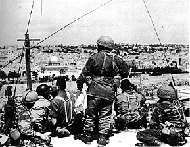Today, June 5, marks the 40th anniversary of the 1967 War and the inception of the Israeli occupation of the West Bank, Gaza Strip and East Jerusalem. Although the war lasted only six days, its ramifications were long-lasting and devastating on the entire Palestinian population and to the Arab region in general.
At the time Israel launched its second major war on the Palestinians – the first being the 1948 War in which the state of Israel was created and over 800,000 Palestinians were displaced or expelled from their homes – the West Bank and East Jerusalem had been annexed to Jordan and the Gaza Strip was under the administrative control of Egypt. Several thousand Palestinians had already been made refugees from the 1948 War, and the Palestine question had been on the table in the international arena, namely the United Nations since then.
Hence, tensions were running high between the fledgling Jewish state and neighboring Arab countries. In the early sixties, Israel was threatening to strike Syria if it did not stop Palestinian guerrilla attacks on Israel from its territories even though these attacks, carried out by the newly found Fateh organization, could hardly be considered as major threats to Israel’s security.
Still, with the looming threat of another Israeli offensive (Israel had previously participated in the tripartite invasion on Egypt’s Suez Canal in 1956), then-Egyptian President Jamal Abdul Nasser amassed Egyptian troops in the Sinai Peninsula and ordered the UN troops out, present there to ensure the demilitarization of the area. Israel exploited this maneuver to launch what it called a “preemptive” assault on Egypt, ostensibly in self-defense. However, Israel had long set its eyes on what is now the occupied territories and used this opportunity to grab more Arab land, namely Jerusalem.
Hence, on the morning of June 5, 1967, Israel launched its attack on Egypt, destroying its grounded air force in a matter of a few hours. Even though at the time, Egypt had the most advanced military force in the Arab world, it was hardly comparable to Israel’s army, which soon entered the West Bank, the Gaza Strip and the Syrian Golan Heights in what was dubbed “Operation Focus.” It first took the Sinai Peninsula in the south, then the Golan Heights in the north before pushing Jordanian forces out of the West Bank and East Jerusalem, boasting that Jerusalem was “finally unified.”
While Israel took a mere six days to defeat Arab troops and occupy the remainder of historical Palestine along with parts of other neighboring Arab countries, the aggression was catastrophic for the Palestinians, who would later refer to the war as “Al Naksa” or “The Setback”, in reference to their first catastrophe “Al Nakba” in 1948.
In the course of these six days of hostilities, an additional 60,000 Palestinians were displaced from their homes, nearly half of them for the second time around. Seven villages in the West Bank including refugee camps in Jericho and half of the city of Qalqilya in addition to the Morrocan Quarter of Jerusalem’s Old City, were completely destroyed.
An estimated 95 percent of the 1967 refugees fled to the East Bank of Jordan where they settled in the country’s already expanding Palestinian refugee camps. While an estimated one million Palestinians remained in the occupied areas of the West Bank, the Gaza Strip and East Jerusalem, an approximate 60,000 Palestinians were abroad during the war and were not included in Israel’s September 1967 consensus. These Palestinians were thus not considered legal inhabitants of the territories and were not granted any legal residency rights there.
Later in June of that year, the United Nations Security Council adopted Resolution 237, which called on Israel to ensure the safety, welfare and security of those inhabitants in areas were military operations took place while facilitating the return of those who fled the hostilities. However, similar to the situation following 1948, Israel openly disregarded UN resolutions and international law, not allowing refugees to return to their homes.
A few months later, UN Resolution 242 was passed, which called for a just solution to the Palestinian refugee problem. It also called on Israel to withdraw from territories occupied in the war in exchange for peace with its neighbors. This resolution as well, was completely shunned by the Jewish state.
Today, 40 years later and after numerous peace agreements and endless negotiations, the Palestinian people in the West Bank, Gaza Strip and East Jerusalem are still forced to live under the suffocating conditions of Israel’s military occupation of their land in addition to the Syrian Golan Heights. In spite of a number of calls for Israel to end its illegal occupation of Palestinian land [the longest in modern history], Israel has continuously shown disregard for international humanitarian law and charters and insists on subjecting the Palestinian population to degrading everyday measures while denying them their national right of an independent Palestinian state. This is in spite of the fact that in 1988, the PLO officially recognized Israel’s right to exist and accepted the establishment of a Palestinian state on 22 percent of historical Palestine.
Nevertheless, issues such as Jerusalem, the right of return for Palestinian refugees and illegal Israeli settlements in the West Bank have all remained unresolved and major points of contention between the two sides. Additionally, the international community with the United States at the helm, has been largely indifferent to the plight of the Palestinians, showing its undeniable bias towards Israel and supporting the right of this state, established and sustained at the expense of an entire nation, to occupy and oppress another people with impunity.







